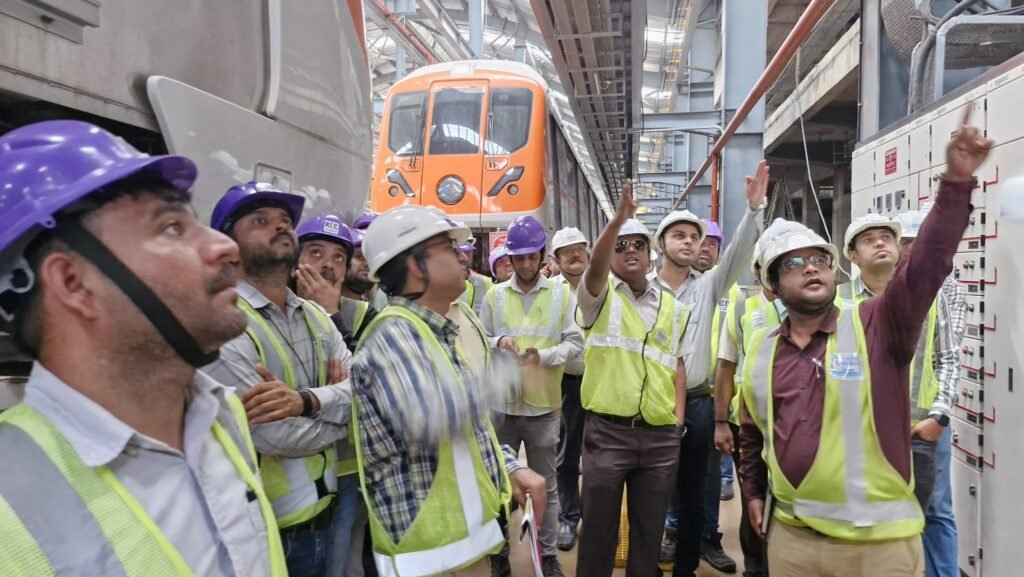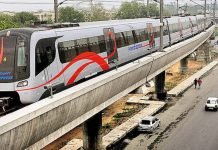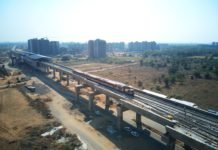About Bhopal
Bhopal, the capital city of Madhya Pradesh, is recognised as the 16th largest city in India and is notable for its rich history and cultural diversity. Established by the Parmara King Bhoj during the 11th century, the city exhibits a wide range of both natural and artificial lakes. As a pivotal hub within Madhya Pradesh, Bhopal is home to numerous research and educational institutions of national significance, including the Indian Institute of Science Education and Research (IISER) and the Maulana Azad National Institute of Technology (MANIT). Additionally, the city hosts a diverse array of industries, encompassing sectors such as automobile manufacturing, textiles, pharmaceuticals, and electrical appliances. Bhopal is one of the greenest cities in India, which reflects the city’s commitment to sustainability.

Urban Growth and the Demand for Metro Transit in Bhopal

Bhopal has experienced remarkable growth over the past few decades. This growing urbanization led to some major challenges in the city that put immense pressure on the city’s existing transport infrastructure. Some of the key challenges faced by the city have been mentioned below:
- Rapid Urbanisation: Bhopal has experienced a consistent and steep rise in population, growing from fewer than 100,000 residents in 1950 to over 2.5 million by 2025. This potential growth started to put strain on the city’s infrastructure, particularly the transport infrastructure. As the city continued to expand, the need for a more efficient and sustainable transport solution became urgent.
- Dependence on Personal Vehicles: Bhopal has witnessed a significant surge in the number of private vehicles, particularly two-wheelers and cars. As per the data provided by the Transport Department in the MP Assembly on February 25, there are a total of 1,507,613 vehicles in Bhopal.
| Vehicle | Total Number |
| Two-Wheelers | 1,080,556 |
| Four-Wheelers | 290,272 |
| Total Vehicles | 1,507,613 |
This growing dependence on private modes of transport has led to increased traffic congestion, pollution, and pressure on urban infrastructure. The metro system will ease congestion and pollution by reducing dependence on private vehicles.
- Traffic Congestion in Bhopal: Bhopal faces severe traffic congestion, especially during peak hours, due to the overwhelming number of private vehicles on the roads. The lack of efficient public transportation forced the citizens to rely heavily on personal vehicles. The introduction of the metro system will alleviate the traffic congestion in the city.

Bhopal Metro: From Congestion to Connectivity
- May 2013: Rohit Associates Cities & Rails Pvt. Ltd. was appointed to prepare the master plan for the Bhopal Metro Project. The master plan proposed a 105 km network with 6 corridors for Bhopal Metro, out of which Lines 2 & 5 were identified for Phase 1.
- December 2016: The State Government approved the Detailed Project Report (DPR) for Phase 1, covering a route length of 27.90 km.
- October 2018: The Central Government approved the DPR of Phase 1 with a route of 27.90 km
- January 2019: Construction work for Phase 1 of the Bhopal Metro officially commenced.
- September 2019: The Chief Minister of Madhya Pradesh laid the foundation stone of the Bhopal Metro and named it Bhoj Metro, in honor of Parmar King Bhoj.
Bhopal Metro: Paving the Way for Modern Urban Transit
Overview
The Bhopal Metro, also known as Bhoj Metro, is an under-construction Mass Rapid Transit System (MRTS) for the city of Bhopal. The project is being managed and operated by Madhya Pradesh Metro Rail Co. Limited (MPMRCL). Phase 1 of the Bhopal Metro comprises two corridors, featuring a total of 28 stations. Phase 1 is projected to become operational by the year 2027.

| Bhopal Metro Phase 1 | |||
|---|---|---|---|
| Corridor | Route | Length | Total No. of Stations |
| Line-2 (Orange Line) | Karond Circle – AIIMS | 14.99 km | 16 Stations |
| Line-5 (Blue Line) | Bhadbhada Square – Ratnagiri Tiraha | 12.91 km | 14 Stations |
Funding Mechanism of Bhopal Metro
- The Bhopal Metro Project is estimated to cost Rs. 6941.40 crores.
Loans from International Agencies
- The project will be financed through a 400 million euro loan from the European Investment Bank (EIB) signed on December 20, 2019, and an official development assistance (ODA) loan from the Asian Development Bank (ADB).
Financial Support From the Government
- In the fiscal year 2024, the Union Ministry of Housing and Urban Affairs approved Rs 882 crore for the Bhopal Metro with an increase of Rs 269 crore from last year’s budget.
- Till now, the Union government has allocated Rs 2239 crore for the Bhopal metro, including this fiscal year.
Rolling Stock for the Bhopal Metro Project
- In May 2022, Alstom bagged the Bhopal Metro’s rolling stock contract from MPMRCL. The contract included the supply and manufacture of 27 trainsets (81 coaches) for the Bhopal Metro Rail Project.
- In March 2023, Alstom started the manufacturing of train sets in Savli, Gujarat. In September 2023, Alstom delivered the 3-coach train set for the Bhopal Metro at Subhash Nagar Depot.

Key Specification
| Authorized Authority | Madhya Pradesh Metro Rail Co. Limited (MPMRCL) |
| Speed and Track | Top Speed: 80 kmph |
| Average Speed: 34 kmph | |
| Track Gauge: Standard Gauge – 1435 mm | |
| Electrification | 750 V DC Third Rail |
| Signalling | Communications-Based Train Control (CBTC) |
| Project Cost | Rs. 6941.40 crores ( Approx) |
| Estimated Ridership | 2.20 lakh/day (2027) |
Contractor’s List
| Contract | Contractor |
| Preparation of a Detailed project report (DPR) of Bhopal Metro | Rohit Associates Cities & Rails Pvt.Ltd |
| Package-01: Construction of Line-2’s 6.225 km viaduct from AIIMS to Subhash Nagar, including entry/exit viaduct to the depot. | Dilip Buildcon Ltd. |
| BH-04: Construction of 3.39 km underground twin tunnels and 2 underground stations at Bhopal Junction Station and Nadra Bus Stand. | KPIL – Gulermak JV |
| BH-07: Ballastless Track (BLT) of Standard Gauge at Elevated and Underground sections, along with Ballasted & Ballastless Track in Depot | Larsen & Toubro (L&T) |
| BH-IN-02: 156 Rolling Stock cars for Bhopal metros, including Signaling and Train Control and Telecommunication Systems | Alstom |
| BH-05: Construction of 12.91 km Blue Line’s viaduct and 13 elevated stations | Afcons Infrastructure |
| BH-03: Construction of elevated viaduct and 6 stations between Subhash Nagar – Aish Bagh Ramp and Sindhi Colony Ramp – Karond Circle | URC Construction (Lowest Bidders) |
| BH-06: Construction of Subhash Nagar Depot | KEC – SAM JV (Lowest Bidders) |
| BH-02: Construction of 8 elevated stations on Line-2 between AIIMS – Subhash Nagar | URC Construction (Lowest Bidders) |
| BH-IN-21: Detailed Design Consultant for E&M works at : IN-04 (5 elevated stations) and IN-O5 (7 underground stations) on Yellow Line | Ayesa India (Lowest Bidders) |

Bhopal Metro Route Information
| Operational | 0 km |
| Under Construction | 6.22 km |
| Approved | 21.65 km |
| Proposed | 77.13 km |
Bhopal Metro Phase 1 Route
Line-2 (Orange Line): Karond Circle – AIIMS
- Length: 14.99 km
- Type: Elevated & Underground
- Status: 6.225 km is under construction between AIIMS and Subhash Nagar
- Depot: Subhash Nagar Underpass (Jinsi)
- Number of Stations: 16
- Station Names: Karond Square, Krishi Upaj Mandi, DIG Bungalow, Sindhi Colony, Nandra Bus Stand, Bhopal Junction, Aish Bagh Crossing, Bogda Pul (interchange), Shubhash Nagar Underpass, Kendriya Vidyalaya, DB City Mall, Sangam Cinema, Rani Kamlapati Railway Station, Habibganj Naka, Alkapuri Bus Stand, AIIMS
| Recent Development on the Orange Line Tunnel Segment Casting Begins In March 2025, Kalpataru Projects International Ltd. (KPIL) – Gulermak JV started pouring concrete to cast the first batch of tunnel ring segments for the underground Package BH-04 of Orange Line. This tunnel ring segment will be utilised for constructing twin tunnels, which come under package BH-04. 2. Trial Runs In March 2025, the MPMRCL successfully conducted an inaugural trial run from the Rani Kamlapati to AIIMS stations along the Priority Corridor of the Bhopal Metro project. |
Line -5 (Blue Line): Bhadbhada Square – Ratnagiri Tiraha
- Length: 12.91 km
- Type: Elevated
- Depot: Subhash Nagar Underpass (Jinsi)
- Number of Stations: 14
- Station Names: Bhadbhada Chauraha, Depot Chauraha, Jawahar Chowk, Roshanpura Chauraha, Kushabhau Thakre Hall, Parade Ground, Bogda Pul (interchange), Prabhat Chauraha, Govindpura, Govindpura Industrial Area, JK Road, Indrapuri, Piplani, and Ratnagiri Tiraha
| Recent Development on Blue Line 1. Afcons Cast First Segment For Blue Line In July, Afcons initiated the casting of segments at Anna Nagar Casting Yard for Package BH-05 of Blue Line. MPMRCL awarded the Rs 1006.74 crore Package BH-05 to Afcons Infrastructure in December 2024. |
Proposed Routes
Line-1 (Green Line): Bairgarh – Awadhpuri
- Number of Stations: 24
- Station Names: Bairagarh, Bairagarh Stadium, Hemu Kalani, Hala Pura Bus Stand, Lal Ghati Square, Idgarh Hills, Collectorate, Cambridge School MG Hospital, Curfew Wali Mata Mandir, Kamala Park, Polytechnic Square, Roshanpura Square, TT Nagar Stadium, Mata Mandir, Jain Mandir, Sharda Mandir, Nutan College, Mansarovar Complex (Habibganj Station), Khushabhau Thakrey ISBT, Anna Nagar, Carmel Convent, Piplani Gurdwara Square, Mahatma Gandhi Square, Awadhpuri
Line-3 (Red Line): Bhauri Bypass (NH12 Junction) – Vasant Kunj Bus Stop
- Number of Stations: 24
- Station Names: Bhauri Bypass/NH12 Junction, Peepainer Village (Aerocity), Airport Road, Gandhinagar, Airport Tiraha, Manubhan Tekri, Lalghati Square, Idgarh Hills, Collectorate, Cambridge School MG Hospital, Curfew Wali Mata Mandir, Kamala Park, Polytechnic Square, Roshanpura Square, TT Nagar Stadium, Mata Mandir, Jain Mandir, Sharda Mandir, Nutan College, Mansarovar Complex (Habibganj Station), Habibganj Naka, 10 No. Square, Sai Board, Vasant Kunj Bus Stop.
Line-4 (Yellow Line): Ashok Garden Auto Stand – Mother Teresa School
- Number of Stations: 21
- Station Names: Ashok Garden Auto Stand, Krishna Campus, Railway Station, Jumerati Road, Curfew Wali Mata Mandir, Kamala Park, Polytechnic Square, Roshanpura Square, TT Nagar Stadium, Mata Mandir, MACT Square, Panchsheel Nagar Bus Stop, Ekant Park, Sahapura Lake, Bhoj University (Chunnabhatti), IIPM Sarvadham, Mansarovar School, CI Height Nayapura Bus Stop, Sanskar Marriage Garden, Bhairagarh Chichali, Mother Teresa School
Line-6 (Brown Line): Habibganj Naka – Mandideep
- Number of Stations: 12
- Station Names: Habibganj Naka, RRL, BU University, Bagsewania Bus Stop, Ashima The Lake City Mall, Sri Ram Colony, C21 Mall, Scope College (Bharopur), Regional 1 / NH-12, Harigangar Nagar, Regional 2, Mandideep.
Recent Developments on the Bhopal Metro Rail Project
1. Madhya Pradesh CM Inspects Bhopal Metro Project
- In July 2025, Madhya Pradesh Chief Minister Mohan Yadav inspected the under-construction Bhopal Metro Project. The Chief Minister boarded a three-coach metro train and undertook a trial run from Subhash Nagar to AIIMS and from AIIMS to Rani Kamlapati Station.
- The Chief Minister mentioned, “The Commissioner of Metro Rail Safety (CMRS) will soon inspect the metro works. Once the CMRS gives clearance, the priority corridor of the Bhopal Metro will be opened for public transport,”.

2. RDSO Completes Oscillation & EBD Trials for Rolling Stock
- In July 2025, the Research Design and Standards Organisation completed Oscillation and Emergency Braking Distance (EBD) trials for the Bhopal Metro’s rolling stock, supplied by Alstom India. The trials were conducted within the time frame of July 9, 2025, to July 21, 2025. The trials took place between Nagar Metro Station and AIIMS Metro Station.

The Impact of the Bhopal Metro Rail Project
Connectivity to Key Landmarks
- The Bhopal Metro Project will play a crucial role in strengthening the city’s connectivity by linking important destinations such as Habibganj Railway Station, ISBT, DB Mall, AIIMS, universities, and key residential clusters. The establishment of the metro system will enable residents to commute across different parts of the city with greater ease and in less time. This enhanced mobility will not only simplify daily commuting but also improve overall accessibility and convenience for the people of Bhopal.
Shifting Traffic Patterns
- The rapid growth of Bhopal has led to a substantial rise in traffic congestion, mainly due to the increasing number of private vehicles on the roads. The Bhopal Metro Project will provide a fast, efficient, and reliable public transport system that will encourage people to shift from private vehicles to mass transit. By reducing the dependency on cars and two-wheelers, the metro will ease the pressure on road networks, reducing traffic congestion in the city.
Boost to Local Economies
- The Bhopal Metro Project will stimulate the economic growth of the city by generating employment during its construction and operation phases. The introduction of the metro system will attract businesses and investments. In addition, metro stations are expected to become new commercial and retail hubs, and they will also influence real estate growth.
Cleaner, Greener Urban Mobility
- The Bhopal Metro will promote sustainable urban mobility by providing a clean and eco-friendly alternative to conventional road transport. Reduced dependence on private vehicles will directly lower fuel consumption and cut emissions of harmful pollutants such as carbon dioxide. This transition will improve air quality and create a healthier environment for residents.
Conclusion
The Bhopal Metro is being built to improve the city’s transport system. As the city continues to expand, the metro will provide a reliable alternative to private vehicles, addressing critical challenges such as traffic congestion and rising pollution levels. The under-construction Phase 1 of the Bhopal Metro Rail Project consists of two corridors and is expected to become operational by 2027. The project is estimated to cost ₹6941.40 crores and is being financed through international loans along with funding from both the central and state governments. Once completed, it is projected to serve more than 2.20 lakh passengers daily and will improve access to major residential, commercial, and institutional hubs. The project highlights Bhopal’s focus on advancing infrastructure while ensuring sustainable growth for the future.








